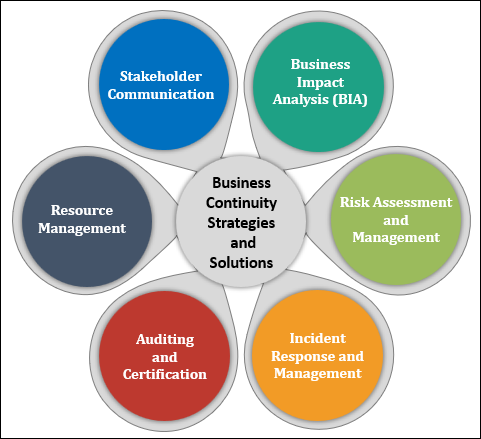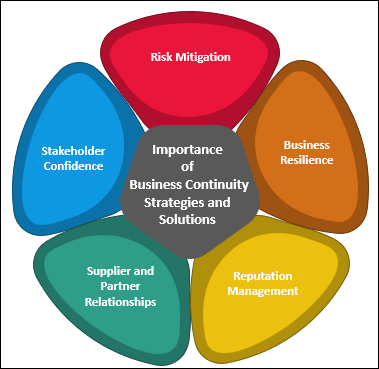ISO 22301:Business Continuity Strategies and Solutions
ISO 22301: Business Continuity Strategies and Solutions is a globally recognized standard designed to fortify an organization's resilience in the face of disruptive incidents. In an increasingly interconnected and unpredictable business environment, the need for a structured and comprehensive approach to business continuity has never been more critical.
ISO 22301 sets out a framework to help organizations prepare for and respond to unexpected events, ensuring the uninterrupted delivery of products and services. By implementing this standard, businesses can demonstrate their commitment to safeguarding stakeholders' interests, maintaining reputation, and securing long-term success. This introduction will provide an overview of ISO 22301, its significance, and its role in helping organizations proactively manage risk and adapt to the ever-evolving landscape of disruptions.
Key elements of ISO 22301 : Business Continuity Strategies and Solutions
- Business Impact Analysis (BIA): ISO 22301 emphasizes the importance of conducting a thorough BIA to identify critical processes, dependencies, and potential impacts of disruptions. This analysis forms the foundation for developing a robust business continuity plan.
- Risk Assessment and Management: The standard underscores the need for a systematic approach to risk assessment, ensuring that organizations identify, evaluate, and prioritize risks. Effective risk management strategies are essential for minimizing business interruptions.
- Business Continuity Policy: ISO 22301 calls for the development and implementation of a documented business continuity policy. This policy should articulate the organization's commitment to resilience, roles, responsibilities, and objectives.
- Business Continuity Plan (BCP): The creation of a BCP is a central element of ISO 22301. This plan outlines the strategies, procedures, and resources required to maintain critical operations during and after a disruption. It covers areas like emergency response, crisis communication, and IT recovery.
- Resource Management: The standard stresses the allocation and management of resources necessary for business continuity, encompassing both human and physical resources. This includes the provision for training and awareness programs.
- Incident Response and Management: ISO 22301 encourages the establishment of a structured incident response and management framework. This ensures a swift and coordinated response to disruptions, minimizing their impact.
- Testing and Exercising: Regular testing and exercising of the BCP are vital components. ISO 22301 mandates the creation of testing schedules and the evaluation of results to enhance the plan's effectiveness.
- Performance Monitoring and Measurement: Organizations must continually monitor and measure their business continuity performance, enabling them to identify areas for improvement and adapt to changing circumstances.
- Continuous Improvement: The standard promotes a culture of continuous improvement, emphasizing the need to review and update the BCP based on lessons learned, changes in the business environment, and emerging threats.
- Documentation and Records: Comprehensive documentation is crucial for demonstrating compliance with ISO 22301. This includes records of risk assessments, incident reports, BCPs, and other relevant documentation.
- Auditing and Certification: ISO 22301 allows for independent audits to assess compliance with the standard. Achieving certification demonstrates an organization's commitment to business continuity and can enhance its reputation.
- Stakeholder Communication: Effective communication with stakeholders, both internal and external, is emphasized. Transparency during and after disruptions helps maintain trust and confidence in the organization.
Importance of ISO 22301 : Business Continuity Strategies and Solutions
- Risk Mitigation: ISO 22301 is essential for identifying, assessing, and mitigating risks that could disrupt business operations. It provides a systematic approach to understanding potential threats and vulnerabilities, allowing organizations to implement measures to reduce the impact of these risks.
- Business Resilience: ISO 22301 promotes the development of robust business continuity plans, ensuring that organizations can maintain critical functions even in adverse conditions. This resilience is crucial for avoiding financial losses, reputational damage, and customer dissatisfaction during disruptions.
- Regulatory Compliance: Many industries and jurisdictions require organizations to have business continuity plans in place. ISO 22301 provides a recognized and internationally accepted framework for compliance, helping organizations meet legal and regulatory requirements.
- Competitive Advantage: Certification to ISO 22301 can give organizations a competitive edge by demonstrating their commitment to business continuity. This can be a valuable differentiator in the eyes of customers, partners, and stakeholders.
- Reputation Management: Maintaining continuity during disruptions, or recovering quickly, is vital for preserving an organization's reputation. ISO 22301 aids in managing reputation risks by ensuring preparedness and effective response to incidents.
- Operational Efficiency: The standard encourages organizations to streamline their processes and resources, eliminating redundancy and waste. This efficiency not only benefits business continuity but also day-to-day operations.
- Stakeholder Confidence: ISO 22301 instills confidence in stakeholders, including customers, investors, and employees. They can trust that the organization is well-prepared to weather disruptions, providing stability and assurance.
- Cost Savings: By identifying vulnerabilities and planning for disruptions, ISO 22301 can help organizations reduce the financial impact of incidents. This includes savings on recovery costs, insurance premiums, and potential fines.
- Supplier and Partner Relationships: ISO 22301 extends its benefits to supply chain and partner relationships. Organizations that adhere to the standard are more reliable and can help ensure the resilience of the entire ecosystem.
- Employee Well-being: ISO 22301 considers the well-being of employees during disruptions. This can improve staff morale, retention, and overall organizational culture.
- Public Safety: For organizations dealing with critical infrastructure or public safety concerns, ISO 22301 can be crucial in preventing catastrophic incidents and ensuring public welfare.
The Benefits of ISO 22301 : Business Continuity Strategies and Solutions
- Enhanced Resilience: ISO 22301 helps organizations become more resilient in the face of disruptions, whether they are natural disasters, cyberattacks, or supply chain interruptions. This increased resilience ensures business operations continue with minimal downtime.
- Risk Reduction: The standard aids in identifying and assessing potential risks and vulnerabilities, allowing organizations to implement proactive measures to reduce these risks. This, in turn, lowers the likelihood and severity of disruptions.
- Improved Recovery: ISO 22301 encourages the development of effective business continuity plans, ensuring that organizations can recover quickly and efficiently after an incident. This minimizes financial losses and customer dissatisfaction.
- Legal and Regulatory Compliance: Certification to ISO 22301 helps organizations meet legal and regulatory requirements related to business continuity. This can prevent legal issues, fines, and damage to an organization's reputation.
- Competitive Advantage: Being certified to ISO 22301 can set organizations apart from their competitors. It demonstrates a commitment to business continuity, which can be a valuable marketing point and a factor in winning contracts and customers.
- Reputation Management: The standard supports organizations in managing their reputation by ensuring they can maintain operations during and after disruptions. This helps prevent reputational damage and the loss of trust from stakeholders.
- Operational Efficiency: ISO 22301 encourages organizations to streamline processes and allocate resources efficiently, reducing operational costs, and improving overall efficiency.
- Stakeholder Confidence: Stakeholders, including customers, investors, and employees, gain confidence in the organization's ability to manage risks and ensure continuity. This trust can positively impact relationships and loyalty.
- Cost Savings: Effective business continuity planning can lead to significant cost savings. These include reduced recovery costs, lower insurance premiums, and avoidance of potential financial penalties.
- Adaptation to Change: ISO 22301 equips organizations to adapt to evolving risks and challenges in the business environment. It encourages a culture of continuous improvement and adaptability.
- Supply Chain and Partner Resilience: Organizations adhering to ISO 22301 help ensure the resilience of their supply chains and partners. This is especially important in today's interconnected business world.
- Employee Well-being: The standard considers employee well-being during disruptions, improving morale, retention, and organizational culture. Employees are reassured that their safety and job security are priorities.
- Public Safety: For organizations dealing with critical infrastructure or public safety concerns, ISO 22301 plays a crucial role in preventing incidents that could jeopardize public welfare.
Conclusion
In conclusion, ISO 22301 stands as a cornerstone in the realm of business continuity, providing organizations with a structured and internationally recognized framework for managing risks, maintaining operations, and safeguarding their future. By adhering to the principles and practices outlined in this standard, businesses can significantly enhance their resilience in the face of unforeseen disruptions, minimize financial losses, and protect their hard-earned reputation.
ISO 22301 not only sets the stage for proactive risk mitigation but also fosters a culture of adaptability, ensuring that organizations can thrive in an ever-changing business landscape. With its manifold benefits, including legal compliance, cost savings, and improved stakeholder trust, ISO 22301 is not just a certification; it's a strategic investment in the continuity and longevity of any organization. Embracing this standard is an assertion of an organization's commitment to excellence, preparedness, and the unwavering delivery of value to its customers and stakeholders, regardless of the challenges that may arise.



